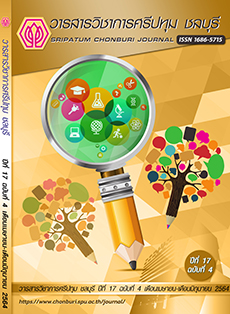GENERATIONS, JOB SATISFACTION AND EMPLOYEES’S WORK-LIFE BALANCE IN A REAL ESTATE BUSINESS COMPANY IN BANGKOK
Keywords:
generations, job satisfaction, work-life balanceAbstract
The main objectives of this research were: to study the relationships between job satisfaction and employees’ work-life balance; and to find the prediction equation to predict employees’ work-life balance by generations and job satisfaction. The samples comprised of 197 employees from 2,765 employees who worked in an entertainment service company in Bangkok. The samples were selected by the method of simple random sampling. The job satisfaction questionnaire and the employees’ work-life balance questionnaire were used, which had reliabilities of .918 and .821 respectively. The important research results were reported here: 1) There were statistically significant differences at the .05 level. Male employees had got higher in some job satisfaction variables (conditions of work, relationship with supervisor and supervision, and organizational structure and physical environment), overall of job satisfaction, and work-life when compared to female employees, 2) Generation Y employees had got higher in relationship with co-workers when compared to Generation X employees, 3) There were interrelationships among employees’ job satisfaction variables and work-life balance, and 4) Relationship with supervisor and supervision, relationship with co-workers, opportunity for advancement and achievement, and organizational structure and physical environment were significant predictors of work-life balance, explaining 38.40% of work-life balance.
References
สายสุนีย์ เกษม. (2559). ความสมดุลระหว่างชีวิตกับการทํางานของบุคลากรสายวิชาการระดับอุดมศึกษาในจังหวัดเชียงใหม่. วารสารมหาวิทยาลัยพายัพ, 26(1), หน้า 151-174.
อุดมพร ป้องเกียรติชัย. (2560). ความพึงพอใจในการปฏิบัติงานของนักกายภาพบำบัดในคลินิกและโรงพยาบาลเอกชน. การค้นคว้าอิสระบริหารธุรกิจมหาบัณฑิต, คณะพาณิชยศาสตร์และการบัญชี มหาวิทยาลัยธรรมศาสตร์.
Bacharach, Samuel B., Bamberger, Peter, & Conley, Sharon. (1991). Work-home conflict among nurses and engineers: Mediating the impact of role stress on burnout and satisfaction at work. Journal of Organizational Behavior, 12(1), pp. 39-53.
Cinamon, Rachel Gali, & Rich, Yisrael. (2010). Work family relations: Antecedents and outcomes. Journal of Career Assessment, 18(1), pp. 59-70.
Holbeche, Linda. (2017). Influencing organizational effectiveness: A critical take on the HR contribution. New York, NY: Routledge.
Izvercian, Monica, Potra, Sabina, & Ivascu, Larisa. (2016). Job satisfaction variables: A grounded theory approach. Procedia-Social and Behavioral Sciences, 221, pp. 86-94.
Kumar, Khushboo, & Chaturvedi, Rachna. (2017). Work-life balance and job satisfaction from the perspective of multiple job holding women: Comparative analysis of generational cohorts. International Journal of Advances in Management and Economics, 6(5), pp. 32-40.
Langer, Arthur M., & Yorks, Lyle. (2018). Strategic information technology: Best practices to drive digital transformation (2nd ed.). New York, NY: Wiley.
McNamara, Eddie. (1998). The role of thinking and feeling: Extending assessment beyond behavior. Pastoral Care in Education, 16(2), pp. 10-19.
Purohit, Pranay. (2004). Job satisfaction and work motivation. New Delhi, India: Sharada.
Schermerhorn, John R., & Hartley, Robert F. (1994). Management for productivity (4th ed.). Oxford, UK: John Wiley & Sons.
Setiawan, Muhammad Riza, Krishnan, Hari, & Selvan, Tamil. (2019). The relationship between job characteristic and nurse performance in Islamic Hospital of Kendal. Human Factors and Ergonomics Journal, 4(2), pp. 22-28.
Downloads
Published
Issue
Section
License
บทความทุกบทความเป็นลิขสิทธิ์ของวารสารวิชาการศรีปทุม ชลบุรี



